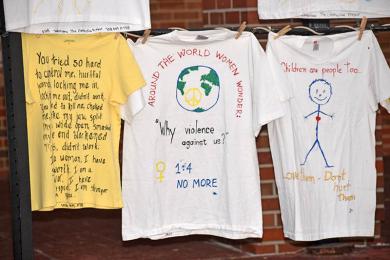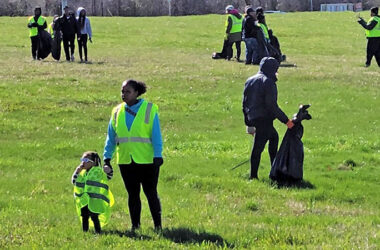After nearly 20 years of providing domestic violence advocacy services to patients, South Suburban Family Shelter found out in early November that UChicago Medicine Ingalls Memorial Hospital is ending its contract.
According to SSFS executive director Jennifer Gabrenya, the agency received a short letter via email from Ingalls in the afternoon of Friday, Nov. 2, that the hospital network was terminating their relationship as of Nov. 30.
After nearly 20 years of providing domestic violence advocacy services to patients, South Suburban Family Shelter found out in early November that UChicago Medicine Ingalls Memorial Hospital is ending its contract.

work, South Suburban
Family Shelter spreads
awareness about
domestic violence.
(File photo)
According to SSFS executive director Jennifer Gabrenya, the agency received a short letter via email from Ingalls in the afternoon of Friday, Nov. 2, that the hospital network was terminating their relationship as of Nov. 30.
“In the contract it says that a 30-day notice is required,” Gabrenya said. “From a professional perspective, I accepted that as appropriate. I would have appreciated a phone call. I would have appreciated a further explanation.”
Gabrenya said a pool of 10 medical advocates rotated evening shifts at four Ingalls locations — the emergency department at the hospital in Harvey and urgent care centers in Flossmoor, Tinley Park and Calumet City.
During their shifts, SSFS medical advocates visited patients in the waiting area and in treatment rooms to provide information about the agency’s free services for victims of domestic violence. They also connected patients in crisis to emergency shelter and other services.
“(This change) makes it a little harder for people to get connected to crisis services,” Gabrenya said. “We reached more than 11,700 people in last fiscal year at those locations. At minimum, those individuals got information about what domestic violence is and a hotline number.”
Each year in the fall, SSFS and Ingalls renewed their agreement for the next fiscal year. This year, Gabrenya knew they’d be dealing with a new group of people, as Ingalls staff has been reorganized after its merger with UChicago Medicine in October 2016.
This September, she visited UChicago Medicine Ingalls leadership to discuss the partnership. Gabrenya said SSFS was requesting a nominal payment increase in the 2018-19 fiscal year. Ingalls had been paying just under $17,000 annually for SSFS’s services at the four locations.
“With the cost of providing services in this day and age, we thought it was reasonable and timely to ask for an increase,” she said. “The amount we were requesting would have been about 20 percent of the total costs to provide services at their four locations.”
SSFS relies primarily on donations and grants to support its work. Local hospitals, Gabrenya said, pay for a portion of the services they receive to supplement the cost.
When Gabrenya sat down with hospital leadership, she said they asked questions about the agency and its work. They were conservative in their language, she said, not committing to a future plan.
“It was really clear they’re not familiar with the agency. They’re not from the community and they aren’t familiar with the work we do,” she said. “I was disappointed and surprised to receive a termination letter instead of them requesting a meeting for negotiation.”
Ingalls spokesperson Kimberly Garrison emailed the H-F Chronicle an official statement from the medical network. Unlike the letter SSFS received, it included details about a new partner for domestic violence services at the Ingalls locations.
“Ingalls Memorial Hospital recently engaged the YWCA of Metropolitan Chicago to support patients in need of domestic violence support and intervention services. The relationship with the YWCA provides patients in the Chicago Southland with additional access to programs such as emergency shelters and other resources including support groups and crisis hotlines.
“Ingalls thanks our previous crisis support services partner, South Suburban Family Shelter, for our longstanding relationship.”
It’s unclear whether these services will differ from those offered by SSFS, which also operates a crisis hotline, counseling, support groups and emergency shelter.
When reached on the phone, Garrison was unable to offer much further detail or comment. She did not have a definite start date of the partnership with YWCA of Metropolitan Chicago and could not delineate what services the agency would provide.
“I don’t have much more to add to the statement. My hands are pretty much tied,” Garrison said. “We really respect the things SSFS has provided. As far as the decision, I don’t know the specific details. We wish them well. It’s still a great organization.”
Garrison said the decision to end the partnership with SSFS was made by administration at Ingalls and not at a higher level in the UChicago Medicine organization.
She isn’t aware of any existing partnership between UChicago and YWCA that might have instigated the shift away from SSFS and said, “I think it was just a decision to make a change.”
For her part, Gabrenya said she is uncertain what YWCA’s role or services might be at the Ingalls facilities specifically for domestic violence survivors.
“I’m a little bit confused because our understanding is that YWCA provides sexual assault services and not specifically domestic violence services,” she said. “We actually connect with the YWCA for our clients who need sexual assault services.”
No one at YWCA of Metropolitan Chicago returned calls for comment. Its website has a page describing sexual violence services, but no specific mention of services for domestic violence survivors.
Gabrenya said SSFS will use this opportunity to reevaluate its medical advocacy program, possibly expanding hours at existing service sites or connecting with survivors at other types of non-medical sites.
After Nov. 30, patients won’t see SSFS medical advocates in the halls or rooms at Ingalls locations.
“We wanted the community to be aware that they wouldn’t be there anymore. We’ve had people tell us that they have been at Ingalls after a domestic violence incident and one of our advocates came in to give them information,” Gabrenya said.
“What I’d like the community to know is that we’re still committed to being out to community. That’s the strength of SSFS.”



